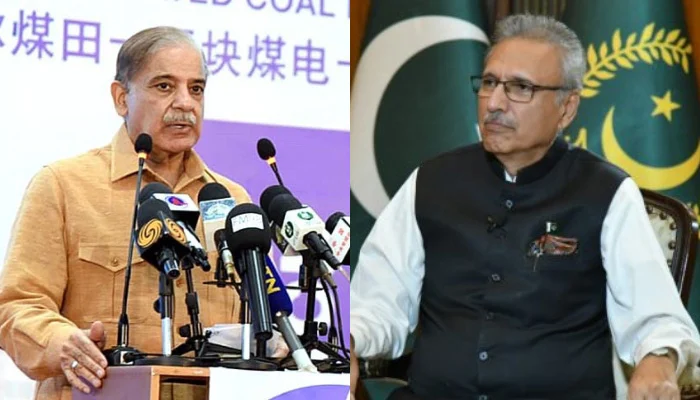- Elections are required to be held within 90 days, says president.
- Multiple fake cases has been registered against politicians, he says.
- No meaningful consultation with the president on policy issues had been undertaken by the PM, reads letter.
ISLAMABAD: President Dr Arif Alvi on Friday penned a letter to Prime Minister Shehbaz Sharif, emphasising that all concerned executive authorities of the federal and provincial governments should be directed to refrain from abuse of human rights and also to assist the Election Commission of Pakistan (ECP) to hold general elections in the provinces of Punjab and Khyber Pakhtunkhwa, within the timeframe, in compliance of Supreme Court’s Order, to avoid further complications including contempt of court.
The move came days after the electoral watchdog had postponed the upcoming elections in Punjab — initially scheduled to be held on April 30 — citing security reasons as the major cause behind the change in plans.
In his letter, the president said that the prime minister, being head of the government, was responsible for safeguarding human rights as well as the fundamental rights of every citizen of Pakistan as enshrined in the Constitution.
The president said that events that were highlighted by the print, electronic, and social media had taken place in the recent past about glaring violations of fundamental and human rights needed to be brought to the premier’s notice to ensure remedial measures and preventive action.
President Alvi maintained that elections of provincial assemblies, in case of their dissolution under Article 105 or Article 112, were required to be held within 90 days under Article 224 (2) of the Constitution.
The top court in its order dated March 1, had directed the electoral watchdog to propose date(s) to the president for holding the poll within 90 days or on a date that deviates to the barest minimum from the aforesaid deadline, he added.
The president said that KP Governor Haji Ghulam Ali was also directed by the SC to appoint a date for holding the general election for the provincial assembly as per the time frame.
“Subsequently, ECP had proposed holding of general elections between 30th April – 7th May, 2023 and general elections for the Provincial Assembly of Punjab were announced to be held on 30th April, 2023 and the same was notified by the ECP,” read the letter.
Role in postponement of polls
The head of the state said that it appeared that federal and caretaker governments in Punjab and KP advised the heads of concerned departments to indicate their inability to provide the necessary support for holding general elections.
He referred to Article 220 of the Constitution which states that “it shall be the duty of all executive authorities in the federation and in the provinces to assist the Commissioner and the election commission in the discharge of his or their functions”.
The president underlined that in his opinion, flagrant violation of the Constitution had been committed by the executive authorities and government departments, adding that ECP had not implemented his announcement of holding general elections in Punjab on April 30 and also blatantly violated the Supreme Court’s order.
The ECP has announced the date of October 8, 2023, for holding general elections of provincial assemblies of Punjab and KP, he said.
He maintained that it was a matter of concern that the prime minister had undertaken no meaningful consultation with the president on policy issues in line with Article 46 of the Constitution, which provided that the PM shall keep the president informed on all matters of internal and foreign policy and on all legislative proposals the federal government intends to bring before the parliament.
He added that Rule 15(5) of Rules of Business, 1973 also highlighted the responsibility of the PM, inter-alia, to furnish such information relating to the administration of affairs of the Federation and proposals for legislation as the president may call for.
In his letter, the president also drew the attention of the PM towards the seriousness of incidents of human rights violations, atrocities of police and law enforcement agencies and grossly disproportionate use of force against the citizens.
He said multiple fake and frivolous cases had been registered against politicians, workers, journalists and media persons; houses of political workers had been raided, and citizens had been abducted without warrants and lawful justification.
The president termed the incidents of human rights violations and oppression by state machinery against innocent citizens as “clear breach and violations of fundamental rights” guaranteed by Article 4 of the Constitution, which provides for, and guarantees citizens to enjoy the protection of the law and to be treated in accordance with the law.
“This has tarnished the image of Pakistan in the international community and is casting negative repercussions on the future of democracy and state of Human Rights in Pakistan,” he added.
The president further highlighted that in the World Press Freedom Index of 2021, Pakistan ranked 145 out of 180 countries and dropped to 157 ie, 12 points downwards in the World Press Freedom Index, 2022, which reflected the sorry state of affairs and this year’s actions and images would further exacerbate Pakistan’s already dismal ranking.
He wrote that in recent months, media had been further suppressed and journalists had also been subjected to charges of sedition and terrorism to stifle dissent and criticism against the government. It appears that a reign of terror has been unleashed against the media persons who have independent opinions, he added.


 Entertainment2 days ago
Entertainment2 days ago
 Latest News1 day ago
Latest News1 day ago
 Latest News1 day ago
Latest News1 day ago
 Latest News1 day ago
Latest News1 day ago
 Latest News1 day ago
Latest News1 day ago
 Entertainment2 days ago
Entertainment2 days ago
 Latest News1 day ago
Latest News1 day ago
 Latest News1 day ago
Latest News1 day ago
























